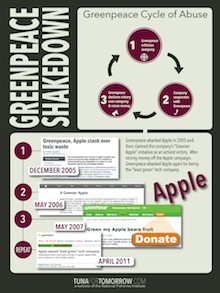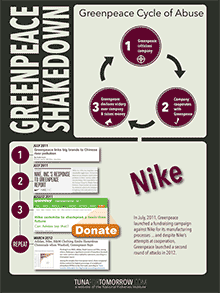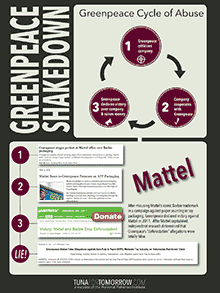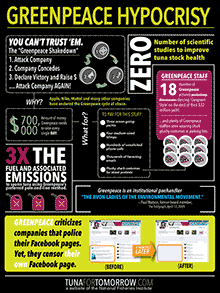The latest attack from the shadowy Campaign for Eco-Safe Tuna and its hired gun Mark Robertson crosses the line from desperate to potentially dangerous.
Robertson, a paid spokesperson, says the Campaign for Eco-Safe Tuna is “handing out information and asking people if they know what dolphin-safe means and what the impacts of dolphin-safe is on eco-systems.” But the truth is that Eco-Safe is backed by the Mexican tuna fleet and a number of Central American governments with direct financial interests in going back to the days before dolphin-safe tuna.
Here’s what you should know.
Prior to 1990, fishermen caught yellowfin tuna by following dolphin, because the two could often be found swimming together, especially in the area of the Pacific ocean off the coast of Mexico and Central America otherwise known as the Eastern Tropical Pacific.  Crews “fishing on dolphin” would chase dolphin using explosives  or sonic pulses to round up dolphin and their tuna fellow travelers, and then intentionally encircle them with something called a purse-seine net—a net that hangs vertically in the water with weights at the bottom and floats at the top. The tuna were harvested for processing.  The dolphin were “released”—dead or alive—as bycatch.
This all changed starting in the late 1980s, when Americans and people around the world spoke out against the old ways and called for steps to be taken to protect dolphin. Â American tuna companies worked with the movement, and stopped buying fish caught by chasing dolphins. Congress went a step further, prohibiting the sale of canned tuna in U.S. markets that was caught by chasing and intentionally encircling dolphins.
There is only one major tuna producing country that still does things the old way: Mexico.  Fishing in the Eastern Tropical Pacific, Mexican tuna boats “fish on dolphin” to this day, chasing the mammals in speedboats, encircling them in their nets and releasing them when able, but still killing around 1,000 each year allowed under dolphin mortality limits.
Because of this, Mexico can’t sell its tuna as “dolphin-safe” on the U.S. market, and both the Mexican tuna canning industry and the Mexican government are understandably very upset about that. They have even sued the United States in the World Trade Organization, in an attempt to get America to change its laws and return to fishing practices from the old days. The Mexican tuna fleet and its allies in government have enlisted Robertson, and his firm Potomac Global Advisers, to make their case to the public. And we can see why they need help. The simple truth is that, far from being concerned about the well-being of dolphin, Robertson and Eco-Safe are hell-bent on getting non-dolphin safe tuna sold on American shelves, twenty years after the Americans condemned it, the tuna industry moved away from it, and Congress banned it.
No wonder they need to resort to desperate stunts and irresponsible attacks.
We’ve heard plenty of scary but vague language about what the Eco-Safe tuna group is against. Now it’s time for them to fess up to what they are for: chasing dolphin.








